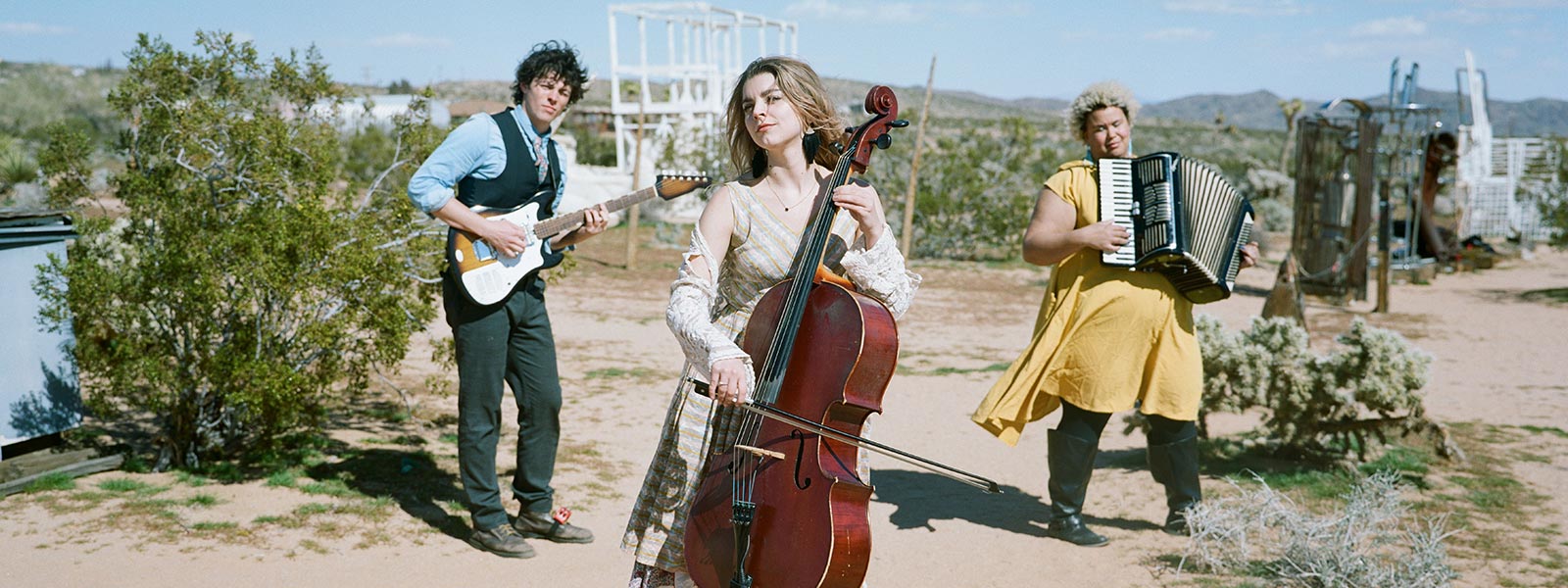Musical trio Bandits on the Run creates momentum following a year of growth
While the past year or so hasn't exactly gone the way the members of Bandits on the Run planned, it has been full of opportunities and surprises for the Brooklyn-based band. The trio — Regina Strayhorn (B.F.A. Drama '13, H.S. '09), Sydney Torin Shepherd (B.F.A. Drama '13, H.S. '09) and Adrian Blake Enscoe — recently released their latest EP, "Now Is The Time," and their calendar of live performances is beginning to ramp back up.
At the end of July, Bandits on the Run will lead an immersive storytelling experience at New York's newest park, Little Island, and they'll take the stage at Floyd Fest in Floyd, Virginia. In October, they'll be gracing the stage at the Music Hall of Williamsburg. New events continue to appear on their growing schedule.
All three band members are also actors — Enscoe is a regular on the Apple TV+ series "Dickinson," and will be in the upcoming show "Swept Away" at Berkeley Rep (based on the music of the Avett Brothers). Among other roles, Shepherd appeared in the world premiere of the musical "August Rush," and was in the original Broadway cast of "First Date." And Strayhorn, in addition to acting on stage and screen, writes poetry and is exploring the world of casting.
Tracing their roots back to songwriting sessions during Intensive Arts, the two UNCSA alumni, along with Enscoe, reflect on how their training as actors has influenced their work as musicians and on the unexpected opportunities that have risen out of the ashes of the past year.
Your latest EP, "Now Is The Time," was released June 25. It came about, in a way, as the result of the cancellation of your 2020 tour, which included performing at South by Southwest (SXSW). Can you talk about how the last year has unfolded and what the pandemic experience has been like for you?
Adrian Enscoe: I always say 2020 was the year of the bold pivot, because everyone's plans kind of fell apart. We had a lot lined up for us in the beginning of 2020 and pretty much everything was canceled. Not just South by Southwest... we had a whole tour lined up, we were going to play at the Kennedy Center, I was going to do a show at Berkeley Rep — and all of these things were ground to a halt.
It was such an experience that from a fire, there's rebirth. In the ashes of South by Southwest, there was the seed of this producer, Ryan Hadlock, who found us and reached out and started a burgeoning friendship. From that, we drove to Seattle and recorded the EP.
Sydney Shepherd: We expanded out beyond just writing for ourselves. We had this reward we were doing as a fundraiser for our album, where we'd do a singing telegram for people — and it really caught on. We did like 40 or 50 telegrams, these one minute songs. It was such a good exercise for us to keep writing, bend into different genres and not take ourselves too seriously. We found some really cool ideas just from writing these telegrams for people.
We also wrote some songs for the next season of the animated Netflix series "Storybots." We found these other avenues to branch out to and I'm not sure that would have happened if we were just playing shows and doing things more traditionally over the last year.
You've said how much you enjoy live performances. Now that you're starting to play live shows again, what are you looking forward to most?
Regina Strayhorn: I always think of our performances in terms of two acts, maybe that's the School of Drama in us. Act 1 is our set, our actual performance. And Act 2 is meeting people and getting to hear about what their lives are like and how they respond to the music and what's interesting about the music to them. I really miss that responsiveness because that's fascinating for us as artists and it informs how we perform, too.
Enscoe: And it's always led to really fun interactions with people and some friendships that have ended up lasting years because we have gone out and made the effort to connect with people. We love strangers. That's a legacy of playing in the subways.
You all three have training as actors and work in the field. Can you talk a little bit about the journey to becoming musicians?
Strayhorn: As a kid, I was always into school plays and writing poetry and making up little songs. I found out about UNCSA and applied for the High School Drama program, where Sydney and I met. I just really loved it. Sydney is a giant part of my music journey. We were friends and we'd write songs together every year during Intensive Arts. It just came up organically, we were hanging out and having fun and jamming. If you had asked us back then if that would have turned into a whole career and a huge part of our lives, I don't think we would have said yes. But actually, if you go back, it makes a lot of sense.
Coming from UNCSA, we were super tapped into listening and responding and knowing when something is hitting people. We were aware that what we were doing was actually affecting people in real time. So we kept on chasing it, and it has turned into a full-fledged career for us.
Regina Strayhorn
When I moved to New York, I was really lucky that Sydney came ahead of me so she could guide me. She had met Adrian a few months back in the subway when he was busking — it was a very New York meeting. Adrian encouraged us to go play a couple of songs in the subway and it was incredibly affirming because we would play and people would really respond. Coming from UNCSA, we were super tapped into listening and responding and knowing when something is hitting people. We were aware that what we were doing was actually affecting people in real time. So we kept on chasing it, and it has turned into a full-fledged career for us.
Shepherd: I started doing community theater around 6 or 7, and taking cello lessons at 7. I always knew I wanted to go to school for acting, and I loved going to UNCSA. What was cool about UNCSA was that the music aspect of myself was very encouraged. I played cello in a lot of shows that I did. So, I kind of learned early on that there were ways to combine the two things that I love. I've maintained a career where I can do both. The most enriching projects are the ones where I get to express both of those parts of myself.
Regina and Sydney, how did your time at UNCSA prepare you for life as artists and musicians?
Strayhorn: It was huge, it was five years of our lives. I think the sense of focus and intentionality that UNCSA instills in you, that's been a huge influence.
Shepherd: The encouragement to make your own work was really exciting. I'm not sure there were a ton of other conservatories at the time that wanted to treat actors, specifically, as holistic artists. I really appreciate that other facets of things we wanted to do were encouraged. That really helped us. You don't have to JUST focus on being an actor and that's all you can ever do. It's expansive, and I think that was really cool and helpful.
Enscoe: The thing that I've picked up, not just from Sydney and Regina, but from all the people that I've met from UNCSA, is a strong focus on ensemble, which I think is pretty unique among conservatories. From all the stories that I've heard, it feels like it's really important at UNCSA to have a strong ensemble and to care about all of the members of the team. And I feel like Bandits is in some ways an expression of that. We do everything together, we do everything democratically. And if it's not feeling right for one of us, then we stop and figure it out. And that's a beautiful legacy to take with you.
What advice would you give artists who've recently graduated or are in the process of getting started in their careers?
Enscoe: Don't hate yourself. [laughs] I know it's kind of cliche to say, “Don't be afraid of failure.” But I would actually say to seek failure out. Go towards the things you do where you say, “It's not quite right. I don't have this yet.” The reason that you feel that way is because your taste is really good and you're just waiting for your skill level to catch up.
I would actually say to seek failure out. Go towards the things you do where you say, 'It's not quite right. I don't have this yet.' The reason that you feel that way is because your taste is really good and you're just waiting for your skill level to catch up.
Adrian Enscoe
Shepherd: Don't be afraid to pursue and give attention to other things that you love. The most interesting people that I've met are the people who have lots of varied interests. I think that you should be able to tell yourself, 'Yes and… I don't have to just be this one thing. I contain multitudes.' And do things just because you like them and not because you want to make them a career.
Strayhorn: Know that the training you’ve completed will inform whatever you do next. But don't put yourself in a box. Be open, which can be kind of hard coming from a conservatory, because you've trained yourself to think very specifically about one form of making art. And that transition can be difficult. It should feel hard for the first couple of years. Be aware of that. If it feels hard, that means you're in process.
Get the best news, performance and alumni stories from UNCSA.
SUBSCRIBE TO OUR NEWSLETTERS
July 19, 2021






